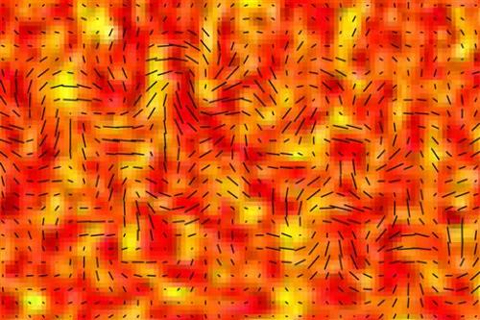“It’s the stuff for which Nobel Prizes are awarded. The big news in cosmology is all about inflation, a theory that the universe suddenly expanded at an enormous rate in the first trillionth of a trillionth of a second,” writes Dr. Kenneth Hicks, Ohio University Professor of Physics, in his April 20 Columbus Dispatch column.
“This theory might once have seemed outlandish. How could space expand ultrafast and then put on the brakes to expand slowly for billions of years? But scientists using the BICEP2 telescope found evidence that supports it. What they found was the signature of inflation in the telltale thermal background left over from the Big Bang.
“But first, let’s back up and examine the difference between the classical Big Bang universe and the one predicted by inflation,” Hicks writes.

This image provided by the BICEP2 Collaboration shows slight temperature fluctuations, indicated by variations in color, of the cosmic microwave background of a small patch of sky and the orientation of its polarization, shown as short black lines. Researchers say since the cosmic microwave background is a form of light, it exhibits all the properties of light, including polarization. The changes in a particular type of polarization, indicated here, are theorized to be caused by gravitational waves. These waves are signals of an extremely rapid inflation of the universe in its first moments. (AP Photo/BICEP2 Collaboration)
“In the classical picture, the universe expands at a nearly constant rate, given by the Hubble constant named for Edwin Hubble, who discovered that the universe was expanding,” Hicks explains.
“More recently, astronomers discovered that the universe is not just expanding but is doing so at a slightly accelerating rate. This is made possible because Albert Einstein’s equations for general relativity include something called the ‘cosmological constant,’ which Einstein initially set to zero, possibly because he believed in a steady-state universe.
“If the cosmological constant is not zero, then our universe will expand at an accelerating pace. This picture is in agreement with observations of light from far-off supernova explosions, which are less bright than they would be if the cosmological constant were zero.
“But what is causing the accelerated expansion? No one knows the physical mechanism, so it has been called ‘dark energy’ for lack of a better term,” notes Hicks.
“If some accelerated expansion is allowed by Einstein’s theory, albeit for yet-unknown sources such as dark energy, then what is to prevent a theorist from speculating that there was a really big acceleration (from a different unknown source) just after the Big Bang?
“That’s just what Alan Guth did back in 1980 when he coined the cosmological term inflation. Guth knew what he was doing and had proposed inflation to solve some nagging problems that arose concerning the classical Big Bang theory.”
Read Hicks’ Columbus Dispatch column.
Read more at Phys.org.
















Comments